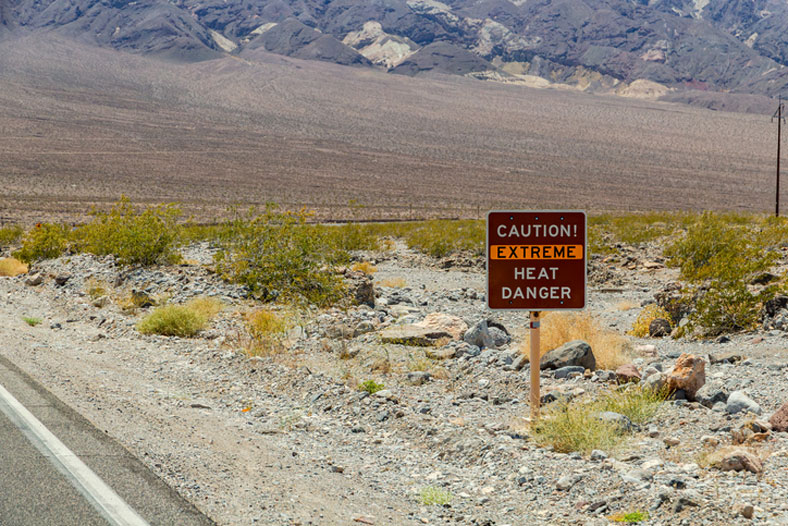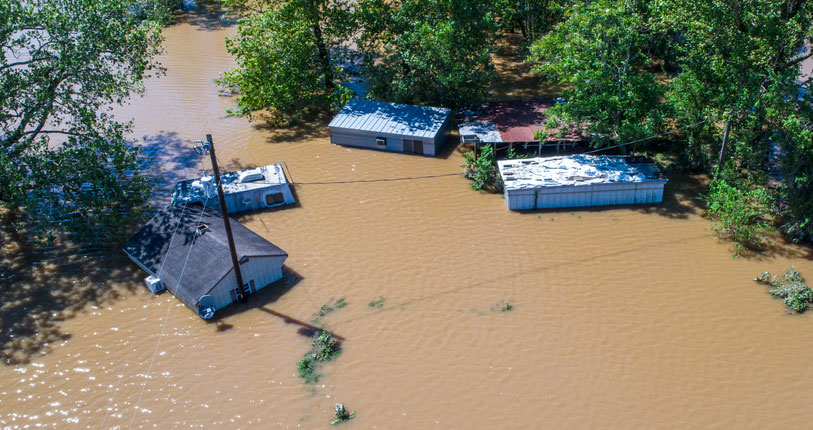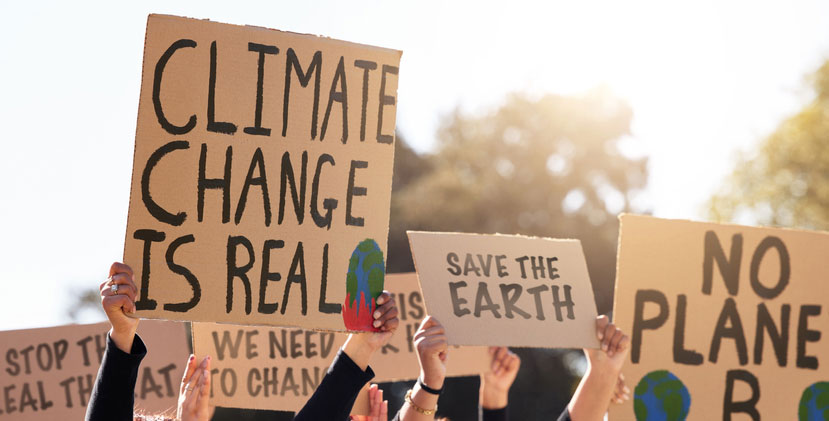Written by Jack Levinson

With every passing year, climate change becomes a greater concern for people from all walks of life. Those who were born in recent decades can’t remember a time when global warming wasn’t a major subject of discussion, though the conversation has only intensified as dangers to the environment continue to accelerate.
In light of the grave stakes of the climate crisis, it’s no surprise many people are moved to take action, getting involved in work that directly responds to, and alleviates damages from, the warming of the planet. Joining the front lines of this fight is an honorable commitment of your time and energy when the world needs it most.
You don’t need to be a climate scientist to devote your career to saving the planet.
If you’re moved to devote your career to causes related to climate change, the social work profession has many opportunities for you. From helping people in weather emergencies find immediate resources to providing long-term emotional support for those impacted by natural disasters, there are numerous roles social workers can take to respond to global warming. What’s important is that you find a role that speaks to your skills, interests, and disposition so that you can invest yourself in this work in the long run.
Indeed, there are many forms of social work promoting community and environmental sustainability, each designed to address a different social need. Read on to learn more about environmental social work and how you can get involved in critical efforts to save our planet.
Environmental Justice as Social Work Practice
When we think of climate activism, we tend to foreground efforts specifically in the realm of ecology, from saving endangered forests to developing green technologies. But helping those who have been directly impacted by climate change is another form of environmental justice work, one that acknowledges that global warming is not merely a threat to our futures but a force of devastation that is already at work.
The Role of Social Work in Environmental Protection
Social workers have long been invested in understanding the roots of inequality and the measures that must be taken to create a more equitable society for all. Indeed, while in their Master of Social Work programs, graduate students learn about the long history of the historical power imbalance in the United States to give context to the many social issues we see in our country today.
Tragically, many of those who face the worst hardships as a result of climate change are those who are already greatly disadvantaged.
After all, beyond the immediate threat to safety of natural disasters, the destruction of storms can displace people from their homes, interfere with their work lives, and add insurmountable new costs to repair and restore property. There are also non-storm weather events, such as droughts, that have affected peoples’ ability to maintain their livelihoods. Over time, these hardships can be as destructive to individuals, families, and communities as the initial weather events that led to their circumstances in the first place.
Social workers are so useful to those experiencing these crises because they already possess the skills and training to take action during critical moments. In this sense, the work they do in response to the climate crisis may not look substantially different than for clients whose situations are unrelated to environmental change. However, social workers invest their energy in becoming intimately aware of the factors that cause their clients’ struggles, meaning they are quick to observe when the impact of global warming is to blame.
In fact, social workers have been among the most discerning observers of the effects of climate change on impoverished communities, seeing firsthand how events that would be harmful to anyone are critically destructive to those who are already in great need. This has made them important advocates for the underserved during times of critical need, such as in the aftermath of flooding or fire.
Because climate change has already had such powerful and lasting ramifications, it is deeply connected to issues of access and opportunity. Social workers are witnesses to this phenomenon in real time, and therefore have illuminating insights to share, as well as the skills and knowledge to make a difference in the lives of those who haven’t gotten a fair chance.

The Heroism of Social Workers in Houston After Hurricane Harvey
Among the most visible effects of climate change in our lives today is the frequency of devastating storms which have left paths of destruction through cities and towns all over the globe. Through the horror of these situations, time and again, we have seen social workers step up to help needy people regain their footing in a worst case scenario.
One such example can be found in the efforts by social workers to strengthen and rebuild the city of Houston, TX in the aftermath of Hurricane Harvey in August 2017. This category four storm caused devastation to many Houston residents, leaving many in dire conditions including short-term and permanent displacement, health issues, post-traumatic stress, and more. Furthermore, the enormous scale of the storm and its damage meant long-term implications for the city’s economy, leading to hardships that would affect residents for years to come. Indeed, the storm has been ranked by the US Government’s National Hurricane Center as the costliest tropical cyclone in American history, a distinction it shares with Hurricane Katrina.
In the lead up to and aftermath of Hurricane Harvey, Houston-based social workers got to work, stepping up during times of great fear and uncertainty to be sure the most vulnerable were protected. Connecting the hardest-hit individuals to organizations that could provide them with food, housing, clothing, and urgent medical care, the work social workers performed for individuals and families was nothing short of life-saving.
In addition to providing front-line assistance to help displaced individuals find the immediate resources they needed, they also acted as key advisors to other relief organizations, including government agencies, non-profits, and community centers, collaborating and communicating to maximize the impact of their work.
Beyond offering immediate relief, Houston social workers were instrumental in guiding the long-term recovery of the city. This multifaceted approach involved providing mental health support for struggling individuals, facilitating employment opportunities, and strengthening community organizations so that they were able to account for the needs of their populations in the long term.
Through these experiences, Houston-based social workers became tremendous advocates, not only within their communities but on the national stage, as federal relief organizations and national non-profits turned their efforts toward aiding the city. This is where the focused historical education of an MSW program, in combination with years of on-the-ground experience, make social workers uniquely insightful into the plight of struggling communities and the efforts that can be made to restore them.
Environmental Social Work Jobs
There is a wide variety of jobs in the social work profession that address the needs of those impacted by climate change, playing to an equally wide variety of skills and interests. Whatever forte you develop as a social work professional, you are likely to be able to put it to use in a job that makes a measurable difference in the lives of the disadvantaged.
Take a look at some of the top job titles for social workers below:
- Disaster response worker. Perhaps the first example that comes to mind when you imagine climate-related social work, disaster response workers provide immediate support and resources to communities that have been hardest hit by environmental catastrophes, with an emphasis on rebuilding and long-term recovery.
- Environmental justice advocate. Especially for those who have spent years in the field, this is a role where you can put your experience to use. Social workers can act as powerful advocates for communities affected by environmental issues, illuminating their concerns to effect change on a societal level.
- Community organizer. Social workers employed by local organizations can lead efforts to alleviate damages of climate change within a community as well as create empowerment resources, such as programs to educate the public about how climate change is affecting them.
- Conservation social worker. Many conservation organizations employ social workers to help them navigate the human cost of the climate crisis in tandem with its impact on nature. This can involve reviewing conservation initiatives to be sure they will have a positive impact on the surrounding population.
- Sustainability coordinator. For the systems-minded social workers out there, there are tremendous opportunities in the arena of sustainability coordinations, as companies of all types are looking to review and revise their practices in keeping with green initiatives. Sustainability coordinators help oversee this process, offering advice and performing important on-the-ground research to guide improvement efforts.
- Environmental health social worker. For those with an aptitude for medicine and public health, there are many critical jobs that focus on the health impacts of environmental issues, addressing issues like air and water quality, creating educational campaigns to protect public health, and working with individuals, communities, and government organizations to mitigate health risks.
The Social Work Dimension of Green Jobs Initiatives
Another exciting emerging position that eco-minded social workers can pursue is becoming a green jobs counselor or coordinator. A rising trend among government agencies, large corporations, and independent enterprises alike, creating green jobs is seen to be essential part of the change needed to repair and restore our environment before it’s too late.
Green jobs initiatives not only contribute to environmental sustainability but also have a significant social work dimension that addresses issues of equity, justice, and community well-being. Social workers play a crucial role in ensuring that green job programs prioritize inclusivity and consider the needs of marginalized communities.
Those who take a macro view of things may see how the green jobs movement is able to address multiple systemic issues at once. The tremendous change called for by climate activists creates an opportunity to redefine systems to create a more equitable country. By working as a green jobs coordinator, you will be making a hugely meaningful difference in the lives of individuals as well as helping lay the foundations of a world that is not only greener but more egalitarian.

Social workers have long been on the front lines of the country’s most pressing issues, and climate change is no different. If you are eager to help the underserved, fight the force of climate change, and participate in the proud tradition of social work as a forward-looking field, a social work career in the climate change field will put your efforts toward one of our most important causes today.
FAQs
What is environmental justice in social work?
There are many ways social workers can be involved in environmental protection, from working on immediate relief efforts for victims of natural disasters to providing mental health counseling, coordinating access to resources, and making formal advocacy efforts in the long term. By working with those impacted directly by the climate crisis, social workers can see themselves on the front lines of the fight to save the environment.
What degree do I need to become an environmental justice social worker?
If you are interested in taking on the responsibilities of a full-fledged social worker, you will need to obtain a Master of Social Work (MSW) degree from an accredited program, as well as your North Carolina State social worker’s license. This is in line with expectations for social workers in any field.
Do I need to specialize in environmental justice in my master’s program in order to become an environmental crisis social worker?
Not necessarily, though if you attend a graduate program that has such a focused opportunity, it would be worth your while. However, many social work programs do not feature this as a focus area, which will not hold you back from opportunities in the field once you start your career. If you’re anxious to begin building experience in climate-related social work, look to your graduate field work as an opportunity to get on-the-ground experience that will inform your understanding of the role of social work in environmental protection.





